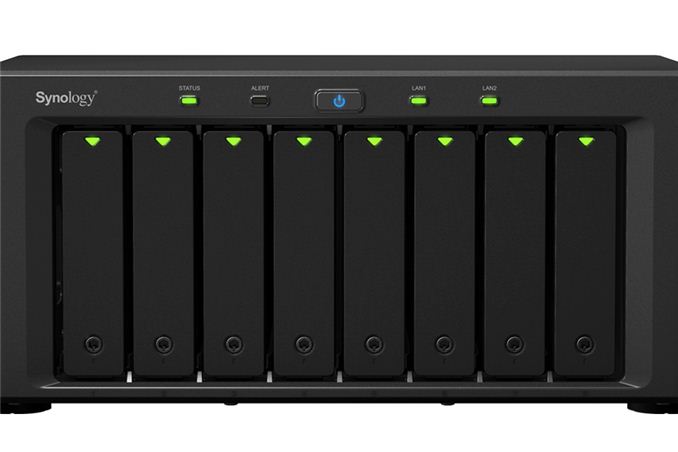Synology DS1812+ 8-bay SMB / SOHO NAS Review
by Ganesh T S on June 13, 2013 4:00 PM EST- Posted in
- NAS
- Storage
- Synology
- Enterprise

Introduction
A number of Intel Atom D27xx-based NAS systems have been evaluated in our labs, even though we formally reviewed only one earlier this year, the LaCie 5big NAS Pro. The Thecus N4800 has made its appearance in a some benchmarks presented in our SMB / SOHO NAS testbed article. Synology is one of the well respected vendors in the SMB / SOHO NAS space, and we have reviewed a number of units from them in the previous years. They recently refreshed their 8-bay SMB / SOHO NAS lineup with the DS1813+. Based on the same platform as the DS1812+ (Atom D2700), it added two extra network ports. However, due to the similarity in the underlying platform, the performance can be expected to be similar to last year's version (except when all four links are teamed together when compared to dual teaming), the DS1812+. The Synology DS1812+, a 8-bay desktop tower form factor offering, has been under stress in our labs since the beginning of this year.
In our experience with Synology NAS units, we have found that they typically manage to tick all the right boxes for the perfect consumer NAS (except for the pricing factor). Does the DS1812+ carry things forward, or do we have something to complain about?
The specifications of the Synology DS1812+ are provided below:
| Synology DS1812+ Specifications | |
| Processor | Intel Atom D2700 (2C/4T, 2.13 GHz) |
| RAM | 1 GB DDR3 RAM (Upgradable to 3 GB) |
| Drive Bays | 8x 3.5"/2.5" SATA / SAS 6 Gbps HDD / SSD (Hot-swappable) |
| Network Links | 2x 1 GbE |
| USB Slots | 2x USB 3.0 / 4x USB 2.0 |
| eSATA Slots | 2x |
| Expansion Slots | None |
| VGA / Display Out | None |
| Full Specifications Link | Synology DS1812+ Hardware Specs |
In the rest of the review, I will cover some unboxing and setup impressions. A detailed description of the testbed setup and testing methodology is followed by performance numbers in both single and multi-client modes. As requested by multiple readers, we will also briefly cover performance with encryption enabled. In the final section, power consumption numbers as well as RAID rebuild times will be covered along with some closing notes.










93 Comments
View All Comments
MadMan007 - Thursday, June 13, 2013 - link
AES-NI support would be a great addition for a real SMB NAS...even SMB's should be concerned with security. What are the chances NAS manufacturers will come out with devices based on AMD Kabini? AMD does a lot less feature segmentation in their chips and Kabini has AES-NI so it seems like a better solution until Intel matches that with Atoms (low TDP Haswells will be too expensive.)JDG1980 - Thursday, June 13, 2013 - link
The two features I look for in off-the-shelf NASes are ECC RAM, and the ZFS file system. Unfortunately, it seems that none so far have saw fit to include them.pwr4wrd - Friday, June 14, 2013 - link
I completely agree with you, Even for home/SOHO use, what good is a NAS unit if you dont have data integrity.Samus - Saturday, June 15, 2013 - link
This will change with the Atom family supporting ECC. I don't know of any real advantages ZFS has over ext4 for home/soho.phoenix_rizzen - Monday, June 17, 2013 - link
Instantaneous near-unlimited number of snapshots, end-to-end checksums, integrated raid features without requiring RAID controllers, integrated volume management, storage pooling, etc, etc, etc.Once you get beyond 1 harddrive, using anything other than ZFS (or other pooled storage system) is heavenly. There's just no comparison to ext*+LVM.
Jeff7181 - Thursday, June 13, 2013 - link
I wonder how multi-user performance would scale if it had a 10 Gbps uplink to a 1 Gbps access switch. Maybe I'm out of touch with arrays of this size, but those numbers seem low for an 8-disk array. Maybe it has to do with the Atom CPU? Maybe the RAID controller has no cache? Honestly I'd be highly disappointed if I spent $1000 on the chassis and another $1000-2000 on hard drives and could barely reach 1 Gbps under the best circumstances.DigitalFreak - Thursday, June 13, 2013 - link
There is no RAID controller. The SATA ports are either off of the Intel embedded ports, or more likely off of a 3rd party controller.SirGCal - Thursday, June 13, 2013 - link
Try again, They used 8x WD4000FYYZ, They run $410 each... If you get a deal on them. Upwards of $500 if you go to a brick and mortar store... at 400 each, that's $3200 just for the drives for their enterprise class drives for this test. Most people aren't going to use them.Gigaplex - Thursday, June 13, 2013 - link
That just backs up their point even more. Spending $1k-2k instead isn't likely to get you faster drives.SirGCal - Friday, June 14, 2013 - link
No, you missed my other point... The 8-drive RAID 5 is a failure waiting to happen, enterprise class or not. When a drive does fail, you'll have to repair it. During that 38+ hours... That is the MOST likely time (also when all the drives are old, warn, and getting their tails kicked in doing massively hard reads) that another one is going to fail... Then you lose the entire array and all of your data. That was the point I was trying to make.